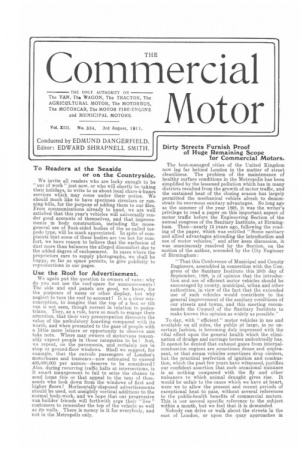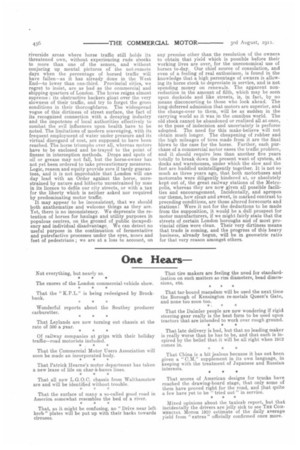Dirty Streets Furnish Proof of Huge Remaining Scope for Commercial Motors.
Page 1

Page 2

If you've noticed an error in this article please click here to report it so we can fix it.
TO Readers at the Seaside
or on the Countryside.
We invite all readers who are lucky enough to be "out of work" just now, or who will shortly be taking their holidays, to write to us about local chars-a-bancs services which may come under their notice. We should much like to have specimen circulars or running-bills, for the kmrpose of adding them to our files. From communications already to hand, we are well satisfied that this year's vehicles will universally render good accounts of themselves, and that improvements in body construction, including the moregeneral use of flush-sided bodies of the so-called torpedo type, will be much appreciated. In spite of complaints that some of these bodies arc too hot for comfort, we have reason to believe that the exclusion of dust more than balances the alleged discomfort due to the added degree of enclosement. In cases where the proprietors care to supply photographs, we shall be happy, so far as space permits, to give publicity to reproductions in our pages.
Use the Roof for Advertisement.
We again put the question to owners of vans : why do you not use the roof-space for announcements ? The side and end panels are good, we know, for the purposes of name or other display, but why neglect to turn the roof to account? It is a clear misconception, to imagine that the top of a box or tilt van is not seen, though correct in relation to pedestrians. They, as a rule, have so much to engage their attention, that their very preoccupation discounts the value of the ambulatory hoarding compared with its worth, and when presented to the gaze of people with a little more leisure or opportunity to observe and take note. Where may owners of motorvans reasonably expect people in those categories to be t .Not, we repeat, on the pavements, and certainly not in shop or ground-floor windows. Shall we suggest, for example, that the outside passengers of London's motorbuses and tramcars—now estimated to exceed 400,000,000 per annum—deserve to be considered? Also, during recurring traffic halts at intersections, is it smart management to fail to seize the chance to send home this or that appeal to the tens of thousands who look down from the windows of first and higher floors ? Horizontally-disposed advertisements should be used, not unsightly vertieal additions to the normal body-work, and we hope that our progressive van-builder friends will forthwith urge their "live " customers to remember the top of the vehicle as well as its walls. There is money in it for everybody, and not in the Metropolis only. The best-managed cities of the United Kingdom now lag far behind London in the matter of street cleanliness. The problem of the maintenance of healthy surface conditions in the Metropolis has been simplified by the lessened pollution which has in many districts resulted from the growth of motor traffic, and the sustained heat of the closing season has largely permitted the mechanical vehicle afresh to demonstrate its enormous sanitary advantages. So long ago as the summer of the year 1898, it was the writer's privilege to read a paper on this important aspect of motor traffic before the Engineering Section of the annual congress of the Sanitary Institute, at Birmingham. Then—nearly 13 years ago, following the reading of the paper, which was entitled "Some sanitary and allied advantages attending the introduction and use of motor vehicles," and after keen discussion, it was unanimously resolved by the Section, on the motion of the author, seconded by the City Engineer of Birmingham : "That this Conference of Municipal and County Engineers, assembled in connection with the Congress of the Sanitary Institute this 28th day of September, 1898, is of opinion that the introduction and use of efficient motor vehicles should be encouraged by county, municipal, urban and other authorities, in view of the fact that the extended use of such vehicles would contribute to the general improvement of the sanitary conditions of our streets and towns, and this meeting recommends the Council of the Sanitary Institute to make known this opinion as widely as possible."
To-day, with " efficient " motor vehicles in use and available on all sides, the public at large, in no uncertain fashion, is becoming duly impressed with the vital effect upon the general health which the elimination of drudge and carriage horses undoubtedly has. It cannot be denied that exhaust gases from internalcombustion engines are sometimes dense and unpleasant, or that steam vehicles sometimes drop cinders, but the practical perfection of ignition and combustion, which the past few years have witnessed, justifies our confident assertion that such occasional nuisance is as nothing compared with the fly and other nuisances to which animal draught gives rise. It would be unfair to the cause which we have at heart, were we to allow the present and recent periods of exceptional heat to pass, without several references to the public-health benefits of commercial motors. This is our second specific reference to the subject within a month, but we feel that it is demanded. Nobody can drive or walk about the streets in the east of London, or upon the quay approaches in riverside areas where horse traffic still holds its threatened own, without experiencing rude shocks to more than one of the senses, and without conjuring up mental pictures of the not-remote days when the percentage of horsed traffic will have fallen—as it has already done in the West End—to lower than one-third. Provincial cities, we regret to insist, are as bad as the commercial and shipping quarters of London. The horse reigns almost supreme : its obstructive backers gloat over the very slowness of their traffic, and try to forget the gross conditions in their thoroughfares. The widespread vogue of this dirtiness of street surface, the fact of its recognized connection with a decaying industry and the impotence of local authorities effectively to combat the evil influences upon health have to be noted. The limitations of modern scavenging, with its frequent employment of water under pressure and its virtual disregard of cost, are supposed to have been reached. The horse triumphs over all, whereas motors have to be enclosed and be-trayed to the point of finesse in interception methods. Drops and spots of oil or grease may not fall, but the horse-owner has not yet been ordered to take precautionary measures. Logic, reason and equity provide sure if tardy guarantees, and it is not improbable that London will one day lead with an Order against the horse, unrestrained by nature and hitherto unrestrained by man in its licence to defile our city streets, or with a tax for the liberty which is neither asked nor required by predominating motor traffic. It may appear to be inconsistent, that we should both anathematize and welcome things as they are. Yet, there is no inconsistency. We deprecate the retention of horses for haulage and utility _purposes in populous centres, on the ground of public inexpediency and individual disadvantage. We can detect no useful purpose in the continuation of fermentative and putrefactive processes under the eyes, noses and feet of pedestrians ; we are at a loss to account, on any premise other than the resolution of the owners. to obtain that yield which is possible before their working lives are over, for the uneconomical use of horses to-day. Our chief source of consolation, and even of a feeling of real enthusiasm, is found in the knowledge that a high percentage of owners is allowing its horse stock to depreciate in service, and is not spending money on renewals. The apparent nonreduction in the amount of filth, which may be seen upon dockside and like streets, is, in fact, by no means disconcerting to those who look ahead. The long-deferred admission that motors are superior, and the change-over to them, will be as sudden in the carrying world as it was in the omnibus world. The old stock cannot be abandoned or realized all at .once, so the pose of indecision and uncertainty is perforce adopted. The need for this make-believe will not obtain much longer. The cheapening of rubber and the high mileages of tires made from it are the final blows to the case for the horse. Further, each purchase of a commercial motor eases the traffic problem, and it should require less than another five years totally to break down the present want of system, at docks and warehouses, under which the slow and the fast are huddled unintelligently together. It is not so much as three years ago, that both motorbuses and motorcabs were diligently hindered at, or absolutely kept out of, the great railway .stations of the Metropolis, whereas they are now given all possible facilities and encouragement. Incidentally, and apropos our theme, how clean and sweet, in marked contrast to preceding conditions, are those altered forecourts and stations ! Were it not for the deductions to be made from the supposition, it would be a dull prospect for motor manufacturers, if we might fairly state that the streets of certain London boroughs and of most provincial cities were clean. Their very dirtiness means. that trade is coming, and the progress of this heavy business, already begun, will be in geometric ratio for that very reason amongst others.






















